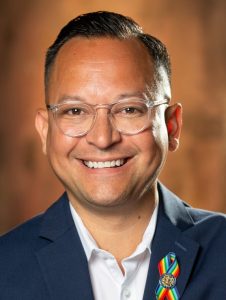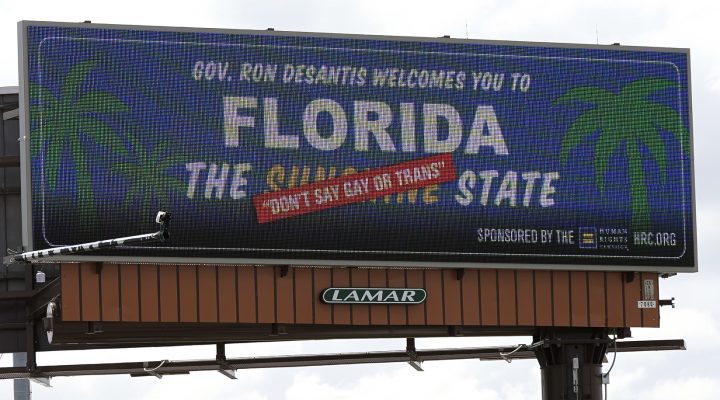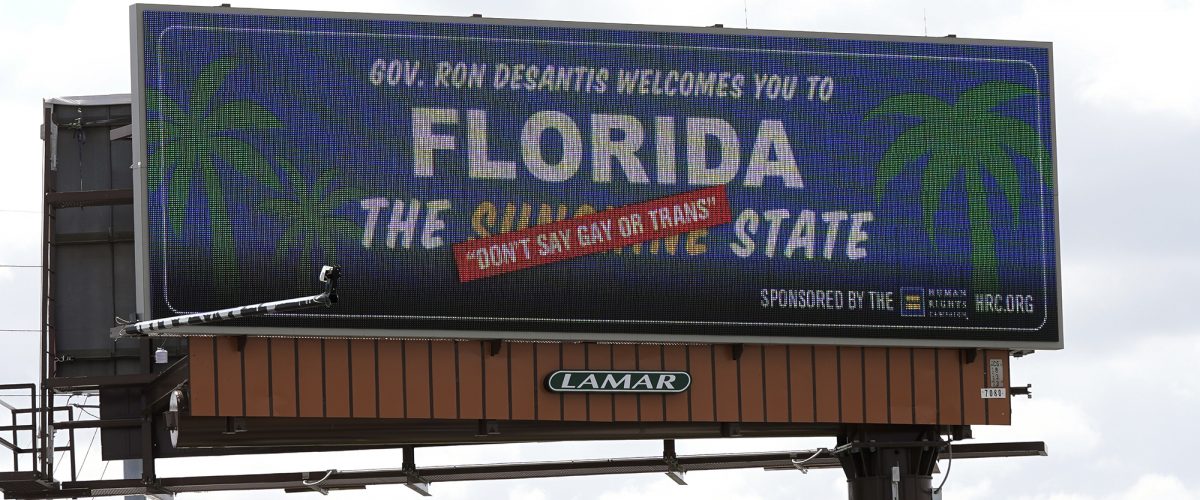It turns out you can “say gay” in Florida’s public schools — just so long as you’re not the teacher presenting classroom content.
On Monday, March 12, a settlement was announced between the state of Florida and an LGBTQ group that had sued the state over implementation of the 2022 Parental Rights in Education Act, labeled by critics as the “Don’t Say Gay” law.
The vaguely written law prohibited, in certain grade levels, “classroom discussion about sexual orientation or gender identity.” Republican advocates said this was needed to ensure parental rights in education. Democrats and other critics of the law said it was intended to scare teachers and parents from talking freely about sexual orientation, gender identity and same-sex marriage — all campaign issues for Florida Gov. Ron DeSantis who, at the time, was running for U.S. president.
The settlement, filed in the U.S. Court of Appeals for the 11th Circuit in Atlanta, says the law does not restrict “literary references to a gay or transgender person or to a same-sex couple” in public school classrooms. It says LGBTQ references may not be prohibited in literature, classroom discussions, students’ academic work or review of their work.
It says LGBTQ references may not be prohibited in literature, classroom discussions, students’ academic work or review of their work.
It also clarifies that teachers may speak freely about their spouses or partners who are of the same sex as them, addressing a widespread fear of some teachers that they would have to hide their own marriages or partnerships.
Further, the agreement says the Florida law does not prohibit lessons about bullying or intervention to stop bullying. It also says schools may continue to promote “safe spaces” for LGBTQ students as well as allow student-run organizations such as gay-straight alliances. Also allowed are book fairs, musicals or plays with LGBTQ references or characters and library books with LGBTQ content, so long as the books are not used for instruction.
What’s left intact is a prohibition on teachers instructing students about LGBTQ topics.
With that small concession, the DeSantis administration declared victory.
“We fought hard to ensure this law couldn’t be maligned in court, as it was in the public arena by the media and large corporate actors,” said state general counsel Ryan Newman. “We are victorious, and Florida’s classrooms will remain a safe place under the Parental Rights in Education Act.”
LGBTQ advocates declared an even greater victory.

Carlos Guillermo Smith
On WBUR’s nationally syndicated radio show “Here and Now” March 12, Carlos Guillermo Smith, senior policy advisor for Equality Florida, one of the advocacy groups involved in the lawsuit, called the settlement a “huge victory.” Smith was a Democratic member of the Florida House of Representatives at the time the bill was adopted.
“Before the settlement, the practical effect of the ban was on what teachers and students could say. … The practical effect is that it had created an environment of fear and intimidation in our public schools. … The law was very punitive. Teachers could not only lose their jobs if they were found in violation of the don’t say gay or trans law, they could have their teacher’s license suspended, which is the promise of professional ruin.
“So at the end of the day, you saw a lot of self-censorship, the pulling back of any discussion or really a validation of LGBT people existing in our classrooms. We saw the removal of library books that included LGBT people and an exodus of teachers from the profession — both gay and straight — so now the state has been forced to detail in writing the freedom of LGBT students and educators to live and speak openly in our schools.”
Smith said he sees “big takeaways” from the settlement, which he called “a big victory for LGBTQ Floridians, for students, for educators and for families.”
What’s left in the law after the settlement is something that wasn’t even a threat, Smith declared.
“The law says that classroom instruction on sexual orientation and gender identity is prohibited. That will virtually have no impact on our schools because no educator was teaching or instructing on sexual orientation or gender identity,” he said. “That was never a problem in our public schools because it was never happening in our public schools. What did happen is we saw a vague and bigoted law passed and signed by Gov. Ron DeSantis that was used to chill speech and to scare teachers away from acknowledging the existence of LGBTQ people entirely.
“That will virtually have no impact on our schools because no educator was teaching or instructing on sexual orientation or gender identity.”
“So much of the damage has already been done but this settlement agreement is a huge step towards repairing some of that damage and being able to move forward so that every student is protected and every family is respected,” Smith said.
He added: “The state and the Department of Education weaponized the vagueness of this law to go after teachers who dared even include LGBT people in the classroom. They passed this law to prop Gov. DeSantis, his presidential campaign up. It failed and now the law and his agenda is being dismantled piece by piece.”
Education Week reports the Florida legislation, meanwhile, has inspired conservative legislators in other states: “Dozens of states have followed suit with their own similar legislative efforts.”
At least six other states — Alabama, Indiana, Louisiana, Mississippi, Oklahoma, Texas, — have passed anti-gay or anti-trans education laws since the Florida bill was adopted.
Related articles:
Ron DeSantis is dead wrong — again | Opinion by Mark Wingfield
Ron DeSantis: The anti-woke prophet of evangelicals | Opinion by Rodney Kennedy
DeSantis and Florida Legislature want to control pretty much everyone | Analysis by Jeff Brumley


